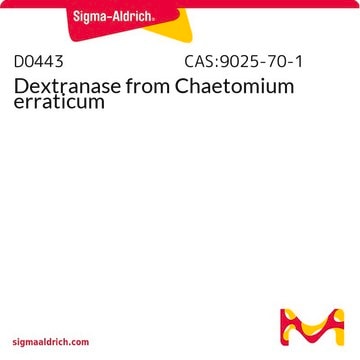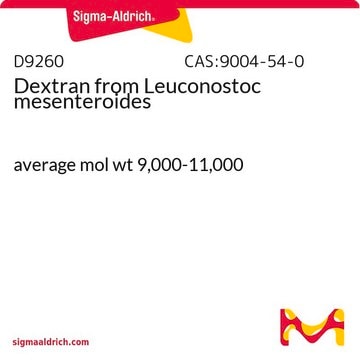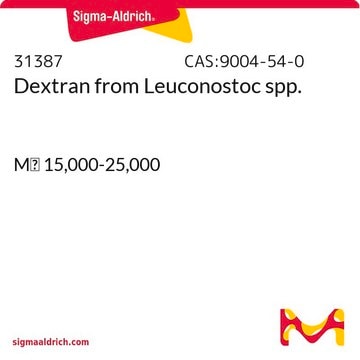D5884
Dextranase from Penicillium sp.
lyophilized powder, 10-25 units/mg solid
Synonym(s):
1,6-α-D-Glucan 6-glucanohydrolase
Sign Into View Organizational & Contract Pricing
All Photos(2)
About This Item
Recommended Products
form
lyophilized powder
specific activity
10-25 units/mg solid
storage temp.
2-8°C
Looking for similar products? Visit Product Comparison Guide
Application
Dextranase from Penicillium sp. has been used in a study to assess a new method of synthesizing biopolymeric affinity ligands. Dextranase from Penicillium sp. Has also been used in a study to investigate the cloning and sequencing of a dextranase-encoding cDNA from Penicillium minioluteum.
Dextranase from Sigma has been used for the hydrolysis of carbohydate polymers, during the study of polysaccharide synthesis by Phanerochaete chrysosporium. It has also been used in the synthesis of new enzymatically degradable thermo-responsive nanogels.
Biochem/physiol Actions
An endodextranase that hydrolyzes α-(1,6)-glucosidic linkages in dextran. Dextrans are undesirable compounds synthesized from sucrose by microbial contaminants during sugar production. They increase viscosity of the flow and decrease industrial recovery. Dextranase has been used for hydrolyzing dextran at sugar mills in order to improve efficiency of sugar production.
Quality
Crude
Unit Definition
One unit will liberate 1.0 μmole of isomaltose (measured as maltose) per min at pH 6.0 at 37 °C, using dextran as substrate.
Other Notes
View more information on enzymes for complex carbohydrate analysis at www.sigma-aldrich.com/enzymeexplorer
Signal Word
Danger
Hazard Statements
Precautionary Statements
Hazard Classifications
Resp. Sens. 1
Storage Class Code
11 - Combustible Solids
WGK
WGK 1
Flash Point(F)
Not applicable
Flash Point(C)
Not applicable
Personal Protective Equipment
dust mask type N95 (US), Eyeshields, Gloves
Certificates of Analysis (COA)
Search for Certificates of Analysis (COA) by entering the products Lot/Batch Number. Lot and Batch Numbers can be found on a product’s label following the words ‘Lot’ or ‘Batch’.
Already Own This Product?
Find documentation for the products that you have recently purchased in the Document Library.
Customers Also Viewed
G S Chaga et al.
Biotechnology and applied biochemistry, 26 ( Pt 1), 7-14 (1997-08-01)
(1) A new concept for producing soluble polymeric affinity ligands is proposed and exemplified. By solid-phase synthesis, an insoluble hydrophilic polymer is converted into an affinity gel. The gel is hydrolytically degraded to water-soluble affinity polymeric ligands which are recovered
H Roca et al.
Yeast (Chichester, England), 12(12), 1187-1200 (1996-09-30)
The DEX gene encoding an extracellular dextranase was isolated from the genomic DNA library of Penicillium minioluteum by hybridization using the dextranase cDNA as a probe. Comparison of the gene and cDNA sequences revealed that the DEX gene does not
Synthesis of new enzymatically degradable thermo-responsive nanogels.
Aguirre, G., Ramos, J., & Forcada, J
Soft Matter, 9(1), 261-270 (2013)
B Garcia et al.
FEMS microbiology letters, 143(2-3), 175-183 (1996-10-01)
A cDNA from Penicillium minioluteum HI-4 encoding a dextranase (1,6-alpha-glucan hydrolase, EC 3.2.1.11) was isolated and characterized. cDNA clones corresponding to genes expressed in dextran-induced cultures were identified by differential hybridization. Southern hybridization and restriction mapping analysis of selected clones
Polysaccharide synthesis by Phanerochaete chrysosporium during degradation of kraft lignin
Leisola M, et al.
Europ. J. Appl. Microbiol. Biotechnol., 15(3), 180-184 (1982)
Our team of scientists has experience in all areas of research including Life Science, Material Science, Chemical Synthesis, Chromatography, Analytical and many others.
Contact Technical Service













